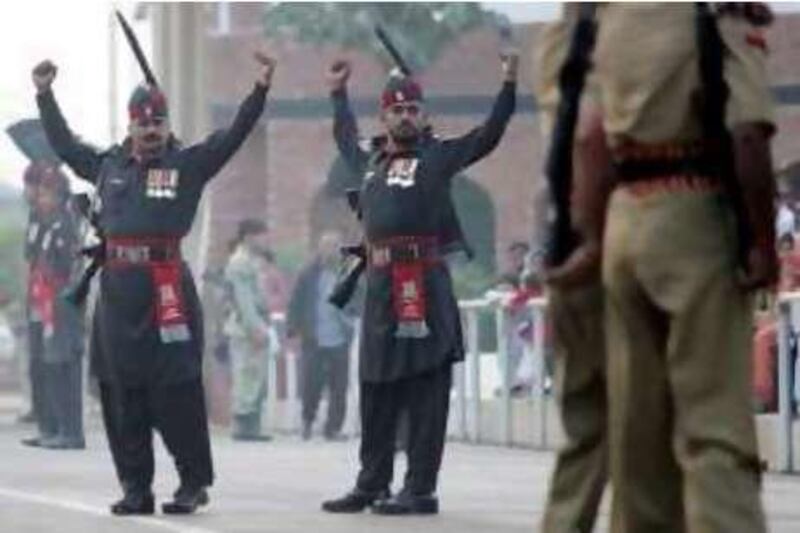ISLAMABAD // The Pakistani government is caught between India and hawkish conservatives within Pakistan following the massacre in Mumbai. The ruling coalition government, led by Asif Ali Zardari's Pakistan People's Party (PPP), is under pressure on two fronts as it fears a rupture with the all-powerful military and India has repeated claims that the terrorist attacks were orchestrated in Pakistan.
Moreover, Pakistan is also under attack from al Qa'eda and its Taliban militants. Terrorist and militant attacks on security forces, including the powerful Inter-Services Intelligence (ISI) agency and politicians, have multiplied in the past two years. Mr Zardari's wife, two-time prime minister Benazir Bhutto, was assassinated a year ago. The president and his government are also facing stringent international scrutiny as India's powerful allies have called for a thorough investigation into the attacks.
America has said it has "no reason to suspect" Pakistan of launching the attack but Condoleezza Rice, the US secretary of state, demanded "absolute, total transparency" from Islamabad. Yesterday, Pakistan maintained its position of defending itself against Indian accusations of the state's participation in the attacks while at the same time making conciliatory gestures by offering co-operation. According to the foreign office, Pakistan has proposed to India that a joint commission be set up to work together on the Mumbai attacks.
The working hypothesis in India is that the attack was the responsibility of the Pakistani terrorist group Lashkar-i-Taiba, which was formed with the help of the ISI to fight against security forces in Indian-held Kashmir in the 1990s. And Pakistanis fear that Indian hawks may be on the warpath. Amir Mir, an analyst on Pakistani jihadi groups, said officials were concerned the Indian Air Force might attack Muridke, the headquarters of Lashkar-i-Taiba, near Lahore, to avenge the Mumbai attacks.
"The Indian military establishment is trying to convince the decision-makers in the Congress government that an aerial attack on Muridke headquarters could be justified on the basis of the pattern of the ongoing drone attacks being carried out inside the Pakistani territory by Afghanistan-based US forces, which are targeting al Qa'eda and Taliban hideouts," Mr Mir said. Pakistan is going through a fragile transition to democracy after more than eight years of military rule under Pervez Musharraf, the former president.
Differences have begun to emerge between the Pakistani government and the army over Pakistan's response to Indian accusations over the Mumbai attacks. The Dawn newspaper reported that Gen Ashfaq Parvez Kayani, the army chief, had met Mr Zardari and the prime minister Yusaf Raza Gilani, and that there had been "clear differences in perception". "Yes, there is a trust deficit on many issues and both are not showing their cards to each other," said a military officer.
Pakistan has spent half of its existence under military rule. Gen Musharraf resigned as president in September after eight years in power. "The Mumbai attacks seem to have exacerbated civil-military tensions within Pakistan also. It is no secret that the military establishment has been uneasy since Pakistan People's Party leader Asif Ali Zardari became president in early September," said an analyst from the Stratfor think tank.
Gen Kiyani has announced he had withdrawn the military from politics but it remains the eminence grise influencing all major decisions ranging from foreign policy to the economy. The Mumbai attacks have once again revived the question of whether the ISI has been brought to heel. Gen Musharraf said retired intelligence officers could be involved in supporting the Taliban and jihadi groups. Gen Kiyani has also pledged to weed out pro-jihadi elements and reform the agency.
The widening gulf between the military and government was most conspicuous when Mr Zardari promised India that the head of the ISI would visit India to help with the investigation. Less than 24 hours later, the decision was revoked and the government announced that a junior ISI officer would fly to India. The official said he doubted whether any ISI official would go to the country with which Pakistan has gone to war three times in its 61-year history.
According to a military source, the distrust between the army and the government began before the Mumbai attack, as the two sides have disagreed over how to conduct the "war on terror" and over the reformation of the ISI. Last week, the government announced the dismantling of the national security council, a powerful decision-making body, set up under Gen Musharraf. The move could have been made to counter claims made by the political opposition that the PPP government was no different than the Musharraf regime and to sideline the military from policymaking.
All previous PPP governments, one which was led by Zulfiqar Bhutto, who was executed by the military dictator Gen Zia ul Haq, and two led by his daughter, Benazir Bhutto, were toppled or undermined by the military. The PPP has been broadly in favour of easing trade restrictions, opening borders and bypassing the dispute over Kashmir, a concept that is anathema to conservative military officers. iwilkinson@thenational.ae





